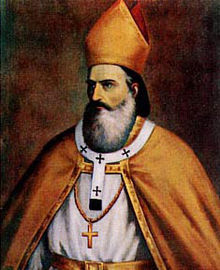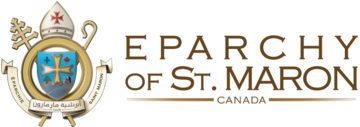
Blissful Patriarch Estephan Doueihi
He was known as “The Saint Patriarch,” “The Saint of the Patriarchs,” “The Father of Maronite History,” “Pillar of the Maronite Church,” “The Second Chrysostom,” “Splendor of the Maronite Nation,” “The Glory of Lebanon and the Maronites.”
• Estephan Boutros Doueihi (also Etienne Doueihi) was born in Ehden, North-Lebanon on August 2, 1630. He had pious and good parents: Deacon Mikhael Doueihi and Mariam Doueihi. He had one brother, Moussa; an uncle, Bishop Elias Doueihi. He lost his father when he was 3 years old.
• When he was 5 years old, he entered the Parochial School of St. Peter in North Ehden, acquiring basics of arithmetic, Arabic & Syriac languages and a solid Christian formation. He distinguished himself by his intelligence.
• Aware of his intellectual capacity and of his religious and moral qualities, Patriarch Gerges Omayra Doueihi and Bishop Elias Doueihi, sent him to Rome June 1941, he was only eleven years old.
• He joined the Maronite College of Rome, founded in 1584 by Pope Gregory XIII and directed by the Jesuit Fathers.
• He astonished everyone by his superior intelligence, beautiful personality and profound piety. His Professor, Father Sparsa, testified: ‘’I taught in many universities, but I have not found the likes of Estephan, in the brightness of his mind and the purity of his life’’.
• He became almost completely blind, because of the intense studying, but through the intercession of Mother Mary he miraculously regained his sight, never having to wear glasses.
• He earned a Doctorate in Philosophy and Theology. He was fluent in Arabic, Syriac, Latin, Italian, Greek and Hebrew. Later he obtained some knowledge of French and Turkish
• In 1655, He refused to stay in Europe and returned to Lebanon, after visiting all the libraries and gathering precious documents about the Maronites.
• He was ordained priest on March 25th 1956 by Patriarch Youhanna at the Monastry of Sts Sarkis and Bacchus in Ehden.
• He opened a free school for children at the Monastry of St Yacoub al Ahbach in Ehden.
• In 1657, he was sent to Aleppo to work for the unity of Christians and to help Bishop Andrew Agheejan who became the first Syrian Catholic Patriarch.
• In 1658, he was named missionary of the Congregation of the Propagation of the Faith and was back to his school in Ehden. He was sent at the same year by Patriarch Bshebhely to Jeiita, keserwen, to teach and preach and then he was sent to South of Lebanon to Saiida, Bekaa and Marjehyoun. Finaly, he was appointed pastor of a Lebanese village called Ardee.
• In 1662, He returned to Aleppo, where he was called ‘’The Second Chrysostome’’, he remained there for 6 years.
• In May 1668, he went with his mother and brother for a pilgrimage to the Holy Land.
• After his return he was surprised by his election as Bishop of Cyprus, on July 8th 1668.
• He resided in Nicosia, and visited all Maronite cities on the island, preaching and organizing the Diocese which has been vacant for 34 years.
• On May 20th 1670, Bishop Estephan Doueihi was elected Patriarch.
• During his 34 years of Patriarchate, Doueihi did not taste rest. He was forced nine times to flee his See in Qannubine to Mar Chalita Mekbes in Ghosta-Keserwan, to Mejdelmouch in the Chouf or in Jbeil and Batroun. He was always on the move hiding in caves and insalubrious places.
• He built 27 churches and many monasteries; he protected the Maronite Church from Latinization and gave her the proper and distinguished identity. He has a major role in the foundation of the Lebanese Order and in the conversion to the Catholic Faith of the Melkite Patriarch Cyril and of the establishment of the first Syrian Catholic Patriarch.
• Patriarch Estephan Doueihi, died as he wishes in Quannubine on May 3rd 1704.
• Even with all the traveling he did due to the political unrest, he wrote 30 extensive books on history and Church liturgy.
• Among his writings: History of the Times, The origins of the Maronites, The defense of the Orthodoxy of the Maronites, The Book of Ordinations, The Series of Maronite Patriarchs, The Lamp of the Sanctuary, The Book of the Consecrations, The Book of the Anaphoras, The Book of the Rites and Benedictions, The Book of Syriac Tunes…
• He was considered by many Maronites of Lebanon but mostly in Zgharta-Ehden to have been a saint.
• The Congregation of the Causes of Saints issued the decree for his beatification cause on December 5th 1996.
• His Holiness Pope Benedict XVI on July 3rd 2008 referred to him as Venerable.
• The Cause of his Beatification is advancing tremendously.

